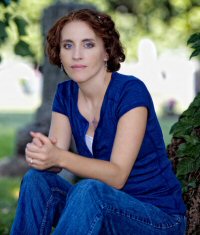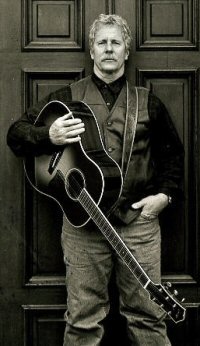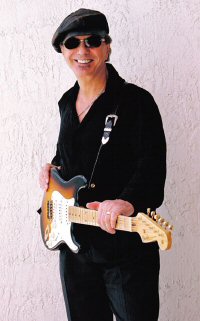Too often, being Catholic means being misunderstood. Especially by evangelicals. In addition to Dion, I spoke with Sarah Hart and Chris Hillman, both of whom have voiced concerns around this issue.
Sarah Hart
 Sarah Hart describes herself as a “singer-songwriter, who just happens to be Catholic, a mom, [and] a wife…” She’s won a handful of Unity awards, which are given to Catholics making a difference in the field of video and/or music. She’s also a part of the Daughters of God, a group of Catholic singers and songwriters.
Sarah Hart describes herself as a “singer-songwriter, who just happens to be Catholic, a mom, [and] a wife…” She’s won a handful of Unity awards, which are given to Catholics making a difference in the field of video and/or music. She’s also a part of the Daughters of God, a group of Catholic singers and songwriters.
Currently, her work is almost exclusively within the church. In the past she played folk clubs and coffee houses, including Nashville‘s Bluebird Cafe, but frequent church bookings, alongside her role as a mother, meant she had to cut out some appearances. She plans on pursuing mainstream opportunities in the future, but for the time being she’s got all the work she can handle. Her latest release is Into These Rooms (Spiritandsong.com).
Hart grew up in the Catholic Church. In college she turned her back on “all things religion, and all things God.” Returning a few years later, she choose Xenos, a low-key evangelical fellowship which fit the bill at the time. After awhile she felt God moving her back into the Catholic faith. “It took me a few years to do what I felt was being asked of me.” Ten years ago she returned to the church.
She concerned about misconceptions that keep believers apart. “I hope to always be about tearing down walls and not building them up, and I really try hard to be ecumenical in all that I do, and I am (gulp) even married to a Protestant! So I hope I have a little room to speak. I also had an amazing life example in my grandparents – she a Catholic and he a Presbyterian – who eloped because their parents would not let them marry outside their respective faiths. They were the most faith-filled, Lord-loving couple I have ever known, who practiced different faiths all their lives. Would that the world could have such love across denominations!”
Based outside of Nashville, she notes that living in the southern U.S., she’s witnessed frequent denominational misunderstandings. “Things can be a bit more intolerant here when it comes to the Catholic vs. Protestant thing. To me, honestly, it is all silliness. I am a lover of Jesus, who happens to be Catholic and love my church and her people. God asks in scripture, "do this; love my son, believe in him, and love one another". So, I’ve done the former and I’m working on the later. I know that I am not meant to be the judge of someone else’s faith or relationship with God, only to love and encourage as Jesus loved and encouraged, and always with truth. I don’t know the number of times I have been asked, "so, are you a Catholic or a Christian?" The question used to stun me, sometimes even make me mad depending upon the spirit with which it was said. But I’ve learned to smile and just say "yes!". Unfortunately, I think there are biases, wrong judgments, and misunderstandings on all sides. But God is God, and He reigns, and He knows what is what, which I for one am very thankful for…I don’t know a sane person alive who would want that kind of authority, anyway. I do imagine a heaven where we are all running around meeting one another, and saying "how did YOU get in here?" You have to laugh about it some, because it will tear you up otherwise.”
Chris Hillman
 As a founding member of the Byrds, Flying Burrito Brothers, Manassas and the Desert Rose Band, Chris Hillman’s place in Rock history is assured. Growing up, there was little exposure to religion in his home. In the seventies he became a believer, and, like Dion, was a member of Calvary Chapel during the eighties. He’s part of a larger upcoming feature, but his comments relevant to evangelicalism and Catholicism are included here.
As a founding member of the Byrds, Flying Burrito Brothers, Manassas and the Desert Rose Band, Chris Hillman’s place in Rock history is assured. Growing up, there was little exposure to religion in his home. In the seventies he became a believer, and, like Dion, was a member of Calvary Chapel during the eighties. He’s part of a larger upcoming feature, but his comments relevant to evangelicalism and Catholicism are included here.
“I am certainly not in any position to judge anybody’s faith. If we all accept [that] the Trinity is the Father, Son and Holy Spirit, and the resurrection, we’re pretty much on the same ball team, regardless if you’re Catholic, Orthodox or Protestant.
He sees these misunderstandings as having their roots in our fallen nature. “When I was first an evangelical Christian, I didn’t put too much credence in the Garden of Eden and Genesis. And then I realized as I got older that there really is validity to man the fallen species. Whereas Christ came to save us, we’re determined – even as Christians – to throw a monkey wrench into something as beautiful, as perfect, as simple as the concept of forgiveness and love that Christ preached in Christianity. We’re determined to throw a monkey wrench into that as a species. Even as Christians. So hence, in every church, or synagogue even, there’s always infighting with the members of the church body or synagogue body. It never fails…It’s just our species. It’s just our fate to aspire to get above that. And the Devils’ main purpose is to make you quit the church.”
He witnessed the misunderstandings first hand. “You know what, there were many, many, many evangelicals that were very judgmental of the Catholic faith…that’s back to man the fallen species, throwing a monkey wrench into one of the most perfect concepts ever given to us to follow. And we somehow manage to goof it up every time. It’s the Devil working.”
Dion
 Dion grew up on the periphery of the Church. “I had a mild Catholic upbringing. You learned about the Trinity, and you learned about the cross. Big time….[I] never went to a Catholic school. In my neighborhood, I grew up in Little Italy. It was an Italian section in the Bronx, and Mount Carmel Catholic Church was the hub of the neighborhood. So it washed over you. The gospel washed over you in ways.”
Dion grew up on the periphery of the Church. “I had a mild Catholic upbringing. You learned about the Trinity, and you learned about the cross. Big time….[I] never went to a Catholic school. In my neighborhood, I grew up in Little Italy. It was an Italian section in the Bronx, and Mount Carmel Catholic Church was the hub of the neighborhood. So it washed over you. The gospel washed over you in ways.”
He believes that in many cases evangelicals simply don’t understand what it is they’re criticizing. “Well, they have a lot of misconceptions. A lot of misconceptions. If the Catholic Church taught what a lot of Protestants think, I wouldn’t be in it. But they don’t. They’re about a million people that are anti-Catholic. But they really don’t know what the church teaches. There’s about a million people probably know what it teaches and decided not to follow it.”
Dion and Hillman eventually left the evangelical world, but both stress there were many positive experiences.
“In some of the denominations I was in I’d be praising God and I’d sit down and my wife would turn to me and she’d say – because she always had a Catholic heart – she’d look over to me and she’d say ‘Dion, I wonder what this church is going to look like in 2,000 years?’
“Protestant denominations are very personality-driven. If the guy at the head of the podium, if he doesn’t have a good personality or good teaching, he’ll loose his audience. But in Catholicism it’s not like that. They move Priests around. Jesus is on the altar. It’s not personality driven. It’s the teaching of the church. Even with the scandals. Even Jesus, a twelfth of his disciples betrayed him. Judas, who was sitting right there at the table with him. And he betrayed the Son of God. How evil is that? So Jesus knew that this is always going to be like this. Even in the church. They try to destroy the church from within. We can’t destroy it…”
Hillman left after over a decade with the Church, in his case for the Greek Orthodox Church. “I started to question it. It wasn’t fulfilling what I was looking for – being as diplomatic as possible. I wasn’t getting the fulfillment out of it. I got curious about the Orthodox faith…So I started to ask questions and then I took classes from the priest.”
Not that he’s willing to play one denomination against the other. “I can’t get into comparing religions. I really can’t. I’m comfortable where I am, and I wasn’t as comfortable when I was an evangelical. But I have nothing against that. I had some beautiful moments then, too.”
Hillman mentioned his concern over the modernization of the Catholic church. “I don’t agree a lot with the Catholic Mass now, the Vatican II. I’ve been to a few of them, they’ve sort of left the old traditions behind…They’re making their church a church of convenience.
”The old things about the Catholic Church, the Latin Mass, a little more mystery to it, and the Sacraments, are gone now… they’re changing to bring in more people, and…I have a problem with that. It doesn’t mean anything to me. I want to hear the liturgy done at an Orthodox church where it has not changed for 1500 years. It is the same liturgy whether you’re in Zambia and they’re doing it in Swahili, or you’re in the middle of Athens and it’s in Greek. It’s still the same liturgy. It has not changed one iota. And the Sacraments are special… This is the Church of Christ.”
While Hillman mourns the loss of mystery within the Church, Dion finds it’s still there, especially compared to what he experienced in the past. “A lot of [evangelical] churches, they don’t want to embrace mystery. Although the mystery has been revealed, and a lot if it it’s not like you can’t understand it. But it goes beyond that. God’s a mystery! No matter how much we understand, we’re not going to understand it all, because we’re not God.”
I asked Dion if he felt Catholics are stereotyped in the media. “Are you kidding? Watch HBO. I think they’re anti-Catholic… Just listen to George Carlin and Bill Maher. Their audience laughs at everything, but there are a lot of people looking on who are not laughing. Including Heaven. Including all the martyrs, and soldiers who fought for our freedom. They’re not laughing. They look on with deep concern and sadness when they hear people laughing like that?”
Another difference Dion noted is the Catholic’s relationship with political parties. “They’re starting to become more conservative, but they were married to the Democratic party. Ever since Franklin Delano Roosevelt. They were almost married, because he helped the poor, the little guy. They still look at it like that.” But Roosevelt wasn’t a Catholic. Kennedy was the first Catholic president. “Yeah, but that didn’t have a lot to do with it. Just because somebody is Catholic… [Presidential candidate John] Kerry was Catholic. He said he was Catholic, but Catholics knew he was just one of those kinda ‘vote for me’ politicians. He’d say anything. He didn’t even know what the faith taught. Especially when somebody believes in abortion. Sometimes Catholics feel like, “well, you don’t care about life, you don’t care about me.” So they weren’t impressed with running out and voting for a Catholic. They heard the issues and they voted.”
© John Cody 2006
